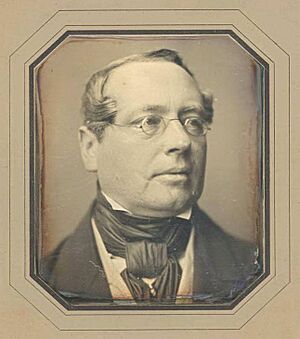Johann Karl Rodbertus facts for kids
Johann Karl Rodbertus (born August 12, 1805, in Greifswald, which was then part of Sweden, and died December 6, 1875, in Jagetzow) was an important German economist and a thinker who believed in socialism. He was also a key member of a political group called the Linkes Zentrum (which means "centre-left") in the Prussian national assembly.
Rodbertus believed in the labor theory of value. This idea suggests that the value of something comes from the amount of work put into making it. Because of this, he thought that things like interest or profit were unfair because they were taken from the workers' efforts. He also believed that capitalist economies often make too many goods, leading to a problem called overproduction.
About His Life
Johann Karl Rodbertus was sometimes known as "Rodbertus-Jagetzow." This name came from his estate, Jagetzow, in Pomerania, which he bought in 1835. His father was a law professor, and Rodbertus himself studied law at Göttingen and Berlin universities. Later, he went to Heidelberg to study philosophy.
After his studies, he traveled a lot in the Netherlands, France, and Switzerland. Eventually, he came back to settle down on his new estate in Jagetzow.
From 1827 to 1832, Rodbertus worked in the justice system in Prussia. By 1837, he had developed his ideas about society and published a book called Die Forderungen der arbeitenden Klassen (which means "The Demands of the Working Classes").
In 1848, he was chosen to be part of the National Assembly. For a short time, he even served as the Minister of Education. In 1849, he became a leader of the centre-left political group. After the 1848 Revolution failed, Rodbertus stopped being involved in politics. He spent the last twenty years of his life living quietly in retirement.
His Economic Ideas
Rodbertus saw socialism as something that should happen slowly, step by step. This is why he was okay with having a king (a monarchy) and why he separated from the more radical Democrats. He thought that social problems were mostly about economics.
Here are some of his main ideas:
- Workers' Share Declines: He believed that the amount of money workers earned from a country's total income kept getting smaller over time.
- Rent and Interest: He thought that money made from land (rent) and from lending money (interest) came from taking advantage of working people.
- Wealth Distribution: Rodbertus argued that how wealth is shared (like rent, profits, interest, and wages) isn't just because of natural economic rules. Instead, it's shaped by history and the laws of a country.
- Economic Crises: He believed that money problems and business downturns happen because production (making goods) and consumption (buying goods) don't match up.
- Overproduction: Rodbertus explained that workers don't earn enough to buy all the goods being made. Meanwhile, rich capitalists and landlords don't spend all their extra money on luxuries. Instead, they invest it in building more factories and making more goods. This leads to too many common products being made, which people can't afford to buy.
The Labor Theory of Value
Rodbertus explained his Labor Theory of Value with three main points:
- Only Labor-Made Goods are Economic: He said that only things made by human work are "economic goods." Things like sunlight, which aren't made by work, are "natural goods" and aren't part of economics.
- Value Comes Only from Labor: He believed that an economic good's value comes only from the work put into it. For example, the value of grain comes from the farmer's work, not from the sun or soil.
- Value Includes All Related Labor: The value of economic goods includes not only the work that directly made them but also the work that created the tools used. So, the value of grain comes from the farmer's work and also from the work of the people who made the plough.
Other economists, like Eugen von Böhm-Bawerk, discussed Rodbertus's ideas. Böhm-Bawerk thought Rodbertus's explanation of how workers were exploited was very clear. However, Böhm-Bawerk disagreed with the Labor Theory of Value. He argued that even something like a gold nugget found in a meteorite (which wasn't made by human labor) would still have economic value.
His Books
Here are some of the books and writings by Johann Karl Rodbertus:
- Die Forderungen der arbeitenden Klassen (The claims of the working classes, 1837)
- Zur Erkenntnis unserer staatswirthschaftlichen Zustände (Toward an appreciation of our economic circumstances, 1842)
- Soziale Briefe (Social Letters), written to Julius von Kirchmann (1850–51)
- Der Normalarbeitstag (The standard work day, 1871)
- Beleuchtung der socialen Frage (Some light on social questions, 1875)
One of his theories about economic crises, found in his Soziale Briefe, was later translated into English as Overproduction and Crises (New York, 1898).
See also
 In Spanish: Johann Karl Rodbertus para niños
In Spanish: Johann Karl Rodbertus para niños
- Karl Marlo
 | Dorothy Vaughan |
 | Charles Henry Turner |
 | Hildrus Poindexter |
 | Henry Cecil McBay |


